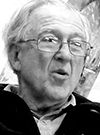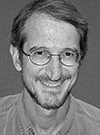James Bogen, Jeffrey Brodsky Are Elected AAAS Fellows
Two University of Pittsburgh professors in the Kenneth P. Dietrich School of Arts and Sciences have been elected as Fellows of the American Association for the Advancement of Science (AAAS) in recognition of their contributions to their fields. Election as an AAAS Fellow is an honor bestowed by the association’s members, who are internationally distinguished scientists, engineers, and innovators.
James Bogen, a faculty member in the Department of History and Philosophy of Science, and Jeffrey L. Brodsky, a professor and Avinoff Chair in the Department of Biological Sciences, will be presented with official certificates and rosette pins during the AAAS annual meeting in Chicago on Feb. 15. The two honorees are among 388 Fellows who will be recognized for their exemplary efforts to advance science or its applications.
in the Department of History and Philosophy of Science, and Jeffrey L. Brodsky, a professor and Avinoff Chair in the Department of Biological Sciences, will be presented with official certificates and rosette pins during the AAAS annual meeting in Chicago on Feb. 15. The two honorees are among 388 Fellows who will be recognized for their exemplary efforts to advance science or its applications.
Philosopher Bogen was honored for his “distinguished research in philosophy of science, including analysis of the epistemology of experimentation, mechanistic explanation, neuroimaging, and the Hodgkin-Huxley model of action potential,” AAAS said.
Bogen’s primary interests have centered on questions about how scientists come to know things. He investigates the nature and interpretation of scientific evidence and its use for developing and evaluating theories. Examples include studying the use of modern functional imaging techniques in neuroscience and studying how the 19th-century neuroscientist John Hughling Jackson used observations of epileptic seizures to investigate the brain’s functional organization. Bogen has also studied questions about causality and causal explanation, particularly as they pertain to neuroscience processes.
Bogen’s publications include the book Aspects of the Development of Wittgenstein’s Philosophy of Language (Routledge and Kegan Paul, 1972). He also coedited and contributed to How Things Are: Studies in Predication and the History of Philosophy and Science (Springer, 1985). He has written dozens of articles in professional journals such as Inquiry, the Philosophical Review, and The Journal of Aesthetics and Art Criticism.
Bogen earned his Bachelor of Arts from Pomona College and both his master’s degree and PhD in philosophy from the University of California, Berkeley. Prior to coming to Pitt, Bogen served as an instructor of philosophy at Oberlin College in Ohio and as a professor of philosophy at Pitzer College in Claremont, Calif., where he was named a professor emeritus in 2000.
Biologist Brodsky was honored for his “distinguished research discoveries on the cell biology, biochemistry, and genetics of the fundamental mechanisms underlying cellular protein quality control in health and disease,” AAAS said.
His research is devoted to understanding how proteins in the human secretory pathway are subject to protein quality control. Of particular interest to Brodsky and his collaborators is a class of proteins known as “molecular chaperones,” which shepherd important biological proteins through their maturation process within cells. These chaperones also serve as quality-control managers, marking misfolded or otherwise defective proteins for destruction before they can lead to disease. Cystic fibrosis, diabetes, and some heart, liver, and neurodegenerative diseases can all arise from defects in these chaperone-mediated processes.
how proteins in the human secretory pathway are subject to protein quality control. Of particular interest to Brodsky and his collaborators is a class of proteins known as “molecular chaperones,” which shepherd important biological proteins through their maturation process within cells. These chaperones also serve as quality-control managers, marking misfolded or otherwise defective proteins for destruction before they can lead to disease. Cystic fibrosis, diabetes, and some heart, liver, and neurodegenerative diseases can all arise from defects in these chaperone-mediated processes.
Brodsky has written more than 150 articles for peer-reviewed journals such as Cell, the Journal of Biological Chemistry, Genetics, and the Proceedings of the National Academy of Sciences. He was a recipient of Pitt Chancellor Mark A. Nordenberg’s Distinguished Teaching Award in 2008.
Brodsky earned his Bachelor of Science in biochemistry from the University of Illinois, Urbana-Champaign, and his PhD in biochemistry and molecular biology from Harvard University. He conducted postdoctoral work in molecular and cellular biology at the University of California, Berkeley, with Randy Schekman, who was one of this year’s Nobel laureates in Physiology or Medicine.
The American Association for the Advancement of Science is the world’s largest general scientific society and publisher of the prestigious journal Science as well as Science Translational Medicine and Science Signaling. AAAS was founded in 1848 and includes 262 affiliated societies and academies of science serving 10 million individuals. The mission of the nonprofit organization is to “advance science and serve society” through initiatives in science policy, international programs, and science education, among other areas.
Other Stories From This Issue
On the Freedom Road

Follow a group of Pitt students on the Returning to the Roots of Civil Rights bus tour, a nine-day, 2,300-mile journey crisscrossing five states.
Day 1: The Awakening
Day 2: Deep Impressions
Day 3: Music, Montgomery, and More
Day 4: Looking Back, Looking Forward
Day 5: Learning to Remember
Day 6: The Mountaintop
Day 7: Slavery and Beyond
Day 8: Lessons to Bring Home
Day 9: Final Lessons

